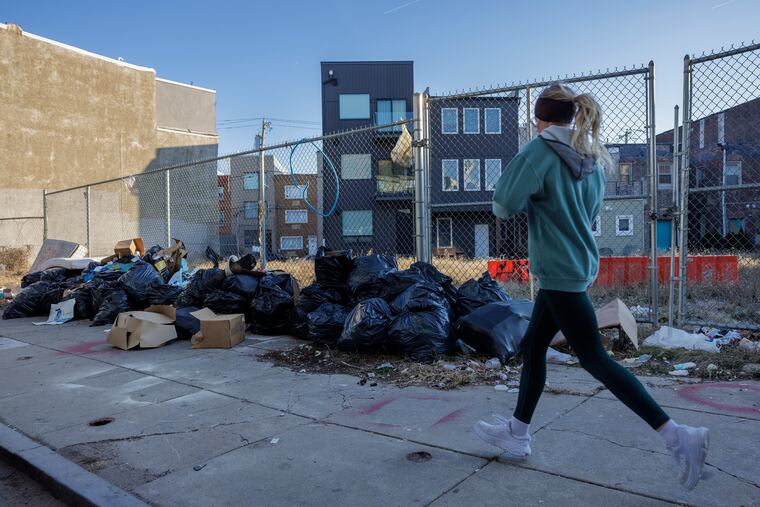Mayor Parker’s budget win paves way for a big new cleaning plan for Philadelphia
Philadelphia is one of the only major American cities that lacks a regular citywide street-cleaning program.

Mayor Cherelle L. Parker made progress on her pledge to make Philadelphia the “safest, cleanest, greenest big city in America” by winning unanimous approval from City Council last week for a $6.37 billion budget that dedicates tens of millions more each year for sanitation.
The Parker administration asserted this would pave the way for at least $214 million, over the next five years, for new “clean and green” programs.
“Residents will be able to see, touch, and feel the positive impacts of this budget in their neighborhoods, along their commercial corridors, and throughout Philadelphia,” Parker said in a statement Thursday.
Philadelphia is one of the only major American cities that lacks a regular citywide street cleaning program, and long relied almost solely on spot sweeping or volunteers to combat litter. Parker campaigned in part on cracking down on litter and illegal dumping through a “holistic strategy,” often reiterating that she wants the city to shed an undesired nickname: “Filthadelphia.”
To that end, Parker created the Office of Clean and Green Initiatives and formed a related 38-person cabinet to guide sanitation and other beautification efforts. She also put the sanitation division, part of the Streets Department, under the newly created office. The Streets Department will continue to handle paving and road maintenance.
» READ MORE: Mayor Parker’s $246 million plan to clean up ‘Filthadelphia’
One major component of Parker’s new budget: $100 million over five years to expand Philadelphia Taking Care of Business (TCB), a program Parker created in 2020 as a member of Council that funnels money through the Commerce Department to neighborhood groups, which in turn contract with companies to clean commercial corridors.
The extra funding would expand the program — which currently pays for about 250 workers across 39 different organizations — to new areas, including some adjacent residential streets. Officials have said it would also add funds for tree plantings and vacant lot cleaning.
Budget documents outlined plans for $4 million to enhance illegal dumping enforcement — including $1 million for new surveillance cameras — and $1.4 million for specialized 10-person cleaning crews that would be assigned to each Council district.
Parker also later committed to a new program to clean every block in the city at least once a year, over the course of the summer. This program would largely use existing funding, officials said.
Other initiatives outlined by the administration included a new twice-weekly trash collection pilot — intended to address the problem of people putting household trash on the curb well ahead of official collection days. The city also plans to install 1,500 Big Belly compacting trash cans.
Specifics on these new initiatives remain scant. The administration has not publicly said where TCB cleaning, street sweeping, and the enhanced trash collection pilot would expand, or when.
The Parker administration said that adding the costs of capital projects and funds to departments such as Parks and Recreation for related cleaning and greening efforts would bring total expenditures through 2030 to $477 million.
» READ MORE: Mayor Parker’s $200+ million plan to clean up ‘Filthadelphia’
Carlton Williams, the former Streets commissioner, was promoted by Parker to head the Office of Clean and Green Initiatives. He described this work as fighting both litter and crime, saying he believes in the “broken windows” theory that posits that fixing public nuisances discourages crime.
“There’s a strong relationship between crime and grime,” Williams said at a news conference that kicked off the citywide cleaning effort.
Parker’s overall cleaning strategy won effusive praise from Council members who, in hearings, described endless complaints from residents about litter and dumping.
“When the constituents call me screaming and yelling at me, I’m like, ‘Who can I call to get some additional help?’” Council President Kenyatta Johnson said.
Yvette Watts, who runs a janitorial company contracted to perform work through TCB, said she was excited about more city money being spent on cleaning.
“Being a cleaning company, I’m somewhat biased, because I want everything clean,” she said. “But I think it’s a wonderful idea. Who doesn’t want their community clean if you live here and work here?”
Parker has linked her political success to improving the city’s quality of life. At the Wednesday event, she linked the passage of her proposed budget to the fulfillment of those promises.
“It’s going to seal the deal and make this new clean and green the standard operating procedure for the city of Philadelphia,” she said. “This is how we’re going to make Philadelphians believe in our city again.”
Staff writer Sean Collins Walsh contributed to this article.